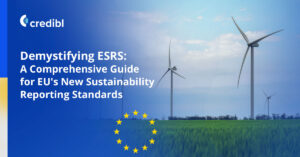ESG is not just about checking off boxes, it is about making a real impact for both, your business and the world. It involves creating lasting outcomes that increase value and foster growth while enhancing our environment and communities.
What is ESG?
ESG: Understanding the Importance of Environmental, Social, and Governance Factors in Investing
Environmental, Social, and Governance (ESG) considerations have gained significant importance in investing. ESG refers to the non-financial criteria that can impact the performance and success of a company or investment. While traditionally, investors have primarily focused on financial metrics such as earnings, revenue growth, and ROI, ESG has become a critical factor in assessing a company or investment’s long-term viability.
The three pillars of ESG – Environmental, Social, and Governance – each play a significant role in determining the sustainability and future success of the company. Let’s take a closer look at each of these factors.
Environmental Factors
ESG’s environmental aspect involves a company’s impact on the environment and its efforts toward reducing carbon emissions and waste. This covers topics such as energy efficiency and resource preservation. Investors are increasingly focused on companies with a positive environmental impact.
Social Factors
Social factors refer to a company’s effect on society, including its relationship with employees, customers, and communities. This covers labor practices, employee gender equality, human rights, and community involvement. Companies that prioritize social responsibility and treat stakeholders with respect are seen as having a more sustainable and successful future.
Governance Factors
Governance factors refer to a company’s leadership, management, and transparency, including executive pay parity, shareholder rights, and board independence. Strong governance practices are viewed as a sign of stability and a well-managed future, which can lead to better financial performance.
Why ESG Matters
Investors are paying more attention to ESG factors for good reasons. Not only do these factors impact a company’s financial performance, but also indicate a more sustainable future and better financial track record. By prioritizing ESG, they can also make a company more attractive to consumers and employees.
ESG considerations also help investors identify potential risks and opportunities. Neglecting environmental concerns could lead to penalties and harm financial performance, while a commitment to sustainability could lead to future benefits.
Moreover, ESG factors can add stability and reduce risk in an investment portfolio. Companies with strong ESG practices are considered more dependable and less susceptible to unexpected events, making them a smart choice for savvy investors.
ESG Reporting
ESG is commonly perceived as a reporting mechanism, however, its roots lie in evaluating the sustainability disclosures of publicly traded companies for investors. With growing interest in ESG information, ESG has become synonymous with reporting. Currently, there is no universal ESG framework, but there is a general agreement on the topics it covers. Due to these variations, companies use sustainability reporting standards to determine their reporting process.
Some of the most commonly used reporting frameworks are the Global Reporting Initiative (GRI), Business Responsibility and Sustainability Reporting (BRSR), Taskforce on Climate-Related Financial Disclosure (TCFD), and the Sustainable Accounting Standards Board (SASB) standards. Companies typically publish sustainability reports to provide ESG information, although a growing number of companies are also showcasing their ESG performance through web pages alongside traditional reports.
ESG Investing
ESG investing involves incorporating ESG factors into investment decision-making. This can be done in several ways, such as:
- Investing in companies that prioritize ESG factors.
- Excluding companies that have poor ESG practices from investment portfolios.
- Engaging with companies to encourage them to improve their ESG practices.
The popularity of ESG investing has risen in recent years as more investors seek to align their investments with their values and make a positive impact. ESG strategies can be applied to various investment products, including equities, bonds, and exchange-traded funds (ETFs).
In conclusion, by considering environmental, social, and governance factors, we can not only make a positive impact on the world but also feel good about our investments. So let’s raise a glass (of sustainably sourced juice, of course) to a future filled with ethical investments and a healthier planet for all.






